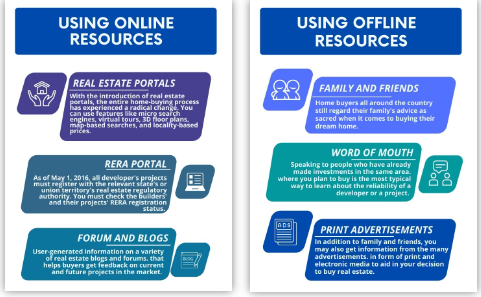Using Online Resources vs. Offline Resources
Deal Acres
Last Update för 2 år sedan
In the last few decades, there has been a significant evolution in how we shop. Online Resources have replaced offline resources in our society. Although it may come as a surprise, today’s house purchase process is mostly conducted online. Searching for and shortlisting properties has evolved into an online game, even though the practice of making the actual purchase hasn’t taken off yet. An ideal blend of offline and internet sources should be used throughout the entire home-buying process.

In order to improve corporate operations and alter the industry standard and so impact the market, technology, and innovation are being condensed. The global pandemic did temporarily have a negative impact on India’s expanding real estate market, but the challenge firmly set the pace and accelerated the change.
Online Resources vs. Offline Resources
Offline Resources
- Family and friends – Home buyers all around the country still regard their family’s advice as sacred when it comes to buying their dream home. Even today when the idea of joint families is slowly disappearing. Before making a final decision, one should take the advice of family members who have already made an investment in a property.
- Word-of-mouth – Speaking to people who have already made investments in the same area. where you plan to buy is the most typical way to learn about the reliability of a developer or a project. You can learn a lot of useful information by simply listening to what seasoned investors and real estate buyers have to say.
- Print advertisements – In addition to family and friends, you may also get information from the many advertisements. in form of print and electronic media to aid in your decision to buy real estate. Developers frequently promote their new projects together with key information such as pricing, payment plans, and schemes.

Online Resources
- Real estate portals – With the introduction of real estate portals, the entire home-buying process has experienced a radical change. You can use features like micro search engines, virtual tours, 3D floor plans, map-based searches, and locality-based prices. in addition to looking at property listings to help you make an informed choice. Some websites have taken things a step further by adding site visits, where they set up pick-ups and drops so that customers can personally see a home. Making a short list of houses that fit your requirements for location, size, and budget has thus become straightforward. The requirement for site visits has begun to be replaced by real-time images and virtual tours.
- RERA portal – As of May 1, 2016, all developer’s projects must register with the relevant state’s or union territory’s real estate regulatory authority. You must check the builders’ and their projects’ RERA registration status. After performing your preliminary study. Selecting a builder and a project that is registered with RERA will ensure that you are covered by the Act in the event of a delivery or completion default. A specific registration number and a certificate would be associated with each developer and project registered under the Act.
- Developers Websites – Once you’ve chosen which developer and project to choose. Browse the developer’s corporate website may be useful. These websites typically provide details about the developer’s ongoing and finished work. As a result, you may learn a lot of history about the business and its creators.
- Forum and blogs – User-generated information on a variety of real estate blogs and forums. that helps buyers get feedback on current and future projects in the market. also, about developer news, and the most recent market dynamics and trends that may influence your buying decision. Being involved on these forums is a smart option if you want to learn more from other investors and buyers.
Disclaimer: The opinions shown above are mainly for informational reasons and are based on market research. Deal Acres is not responsible for any actions made as a result of relying on the provided material and makes no representations as to its accuracy, completeness, or reliability.

